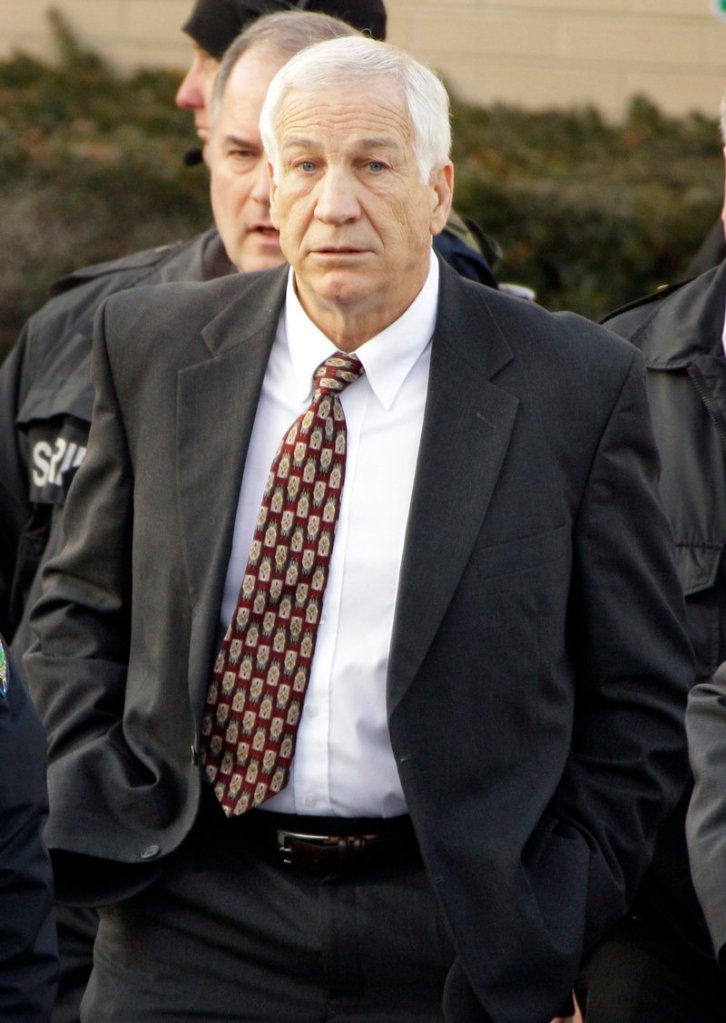I wept June 22 as I listened to Linda Kelly, Pennsylvania’s attorney general, speak regarding Jerry Sandusky’s multiple convictions for child sexual abuse.
I’m not talking a single dainty tear rolling gently down my cheek. I’m talking gulping sobs; red running nose; hiccups — the works.
I was surprised by the intensity of my response. I should not have been — I’m a survivor of sexual abuse. I know the shame of victimization, the manipulation by which an abuser controls a child, the fear that someone will learn my secret and take advantage.
In my case, I did not pursue justice through the criminal system or a civil suit. Unfortunately, many survivors don’t, whether because of statutes of limitation, concern about repercussions or the challenges of proving abuse from years earlier.
It’s been 12 years since I entered therapy (although I had tried several times before, I always quit). I was in therapy for a total of five years. I consider myself a survivor and a functional member of society, and still, some nights my abuser stalks my dreams.
On the night of June 22, some media pundits described Sandusky’s convictions as providing “a sense of closure.”
In my mind, it is unlikely that the verdicts brought much sense of closure to Sandusky’s victims and their families, to say nothing of the countless other abuse survivors around the world.
And it should not bring closure.
If anything, Sandusky’s case illustrates how woefully inadequate our response to abuse has been and how much work still needs to be done. The long delay in investigating accusations, the conspiracy of silence among Penn State leaders, the failure of adults to intervene when they witnessed abuse — all show that many in our society still naively deny the scope of this evil.
We cannot afford to become complacent — to view the Sandusky case as an isolated incident. We must not assume that with his conviction, justice has been served and we can move along to the next big media frenzy.
No state, no educational institution, no parent, no survivor should allow the issue of child sexual abuse to fade from the public consciousness.
As the attorney general said, we should believe kids. But so much underlies that: We must actively listen to children, we must equip them with the skills and self-esteem to say “No” to a potential abuser, we must recognize and respond to signs of stress or dysfunction in family systems, we must make certain that schools and organizations that serve children are safe havens.
Schools and any organizations serving children should examine their strategies for ensuring child safety — not with an eye to avoiding liability or protecting their assets, but with a genuine intent to protect the most important of all assets, the children themselves.
And, yet, to truly eliminate abuse, we must go much, much further. We should invest the necessary resources to understand the psychology of pedophilia — to find treatment options that will enable abusers to learn and practice healthy and appropriate sexual boundaries instead of ever becoming abusers. Warehousing offenders gets them off the street but still leaves a trail of broken victims. What a difference it would make if no one were victimized in the first place.
I remember being upset when I learned my therapist also treated abusers. “Why would she do that?” I wondered. Now, with the passage of time and gathering of insight, I understand. It’s the only way abuse will ever truly stop.
Jerry Sandusky’s actions, like those of any abuser, are heinous, inexcusable and cannot be mitigated by any good that individual might do or have done in this world.
Ultimately, though, abusers are broken people. Like bullies, they are pitiable because they have a gaping hole in their psyche that enables them, perhaps even compels them, to behave in such a way. I cannot condone or excuse their actions, but I understand them as symptoms of deep dysfunction. We need to commit to the research and invest the resources to find humane, effective treatment — perhaps eventually even a cure.
It’s well past time we attack child sexual abuse on every front: child education and protection, community and organizational awareness and implementation, and abuser treatment. Then, and only then, we will truly have closure.
Until we do so, it’s as the mother of Victim 6 said the night of the verdict, “Nobody wins. We’ve all lost.”
Elizabeth Crawford is a writer and educator in northern Maine.
Send questions/comments to the editors.



Comments are no longer available on this story